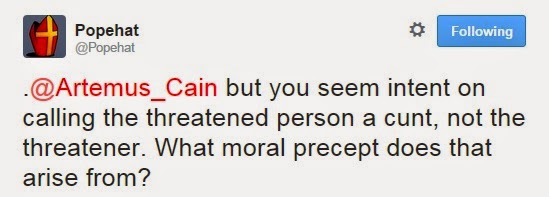When doxing is okay
Doxing (from dox, abbreviation of documents), alternatively spelled doxxing, is the Internet-based practice of researching and broadcasting personally identifiable information about an individual. — Wikipedia
In some cases, this “research” involves simply looking at the email address from which a message came, and including it rather than expunging it when you publish (“broadcast”) the content of that email. Many bloggers have a stated policy of doing this– if you email them, you accept that the content of your message and the email address might be made public on their blog.
Alanah Pearce, an Australian video gamer reviewer (via video blog), recently gained international attention by tracking down and contacting the mothers of the frequently underage boys who were sending her rape and death threats via email, Facebook messages, Twitter, etc.
I’m okay with these things.
I think what Pearce is doing is awesome, actually. Frequently when I see someone saying horrible things on the internet, I wish there was a way to find out if their loved ones could see it. Whether they know that their family member is, in their spare time, using that time to harass people, espouse bigotry, and in general be a despicable human being. I feel simultaneously a sympathetic horror for what this woman is going through, and a desire that couples generally would hang out in the same sorts of internet spaces as their spouses, and parents as their children.
But I would never try to enforce such a thing, because sometimes privacy and anonymity are very important and must not be violated. If you’ve been following Gamergate, you know that quite well. You might know that Felicia Day’s personal information was published on the internet shortly after she wrote an essay expressing concern about that exact thing. You might know that Brianna Wu and Anita Sarkeesian have both fled their homes after internet harassers published their home addresses and expressed an interest in paying a visit.
Some people refrain from even sharing their names online, because they are whistleblowers or fear other kinds of recrimination from their employers, because they are trans or gay but not openly so, because they are atheists but not only so…..there are all kinds of reasons why a person might not be doing anything wrong, but not want every aspect of his or her identity made known.
That’s why doxing such individuals is wrong.
Rebecca Watson, noted skeptic and feminist who has been experiencing harassment and threats online for years because of these things, published an essay on Friday entitled Why I’m Okay with Doxing. That’s not the type of doxing she was talking about.
The type of doxing she was talking about is the kind I mentioned earlier– publishing the name and/or email address of people who made this information available themselves in the process of insulting, harassing, and threatening others.
The distinction seems quite clear to me, but perhaps that’s because I actually read her essay. Several other people seem to have not made it past the headline.
Ken White of Popehat had an amusing exchange on Twitter with such a detractor, also on Friday, which I summed up thusly:
Accuse someone of breaking the law. When questioned, scramble frantically to find the law you accuse someone of breaking, which you didn’t know existed when you made the original accusation. When questioned further, admit that it’s not against the law. When asked for a moral basis for condemnation, scramble frantically to find one of *those*. Fail completely. Take ball. Go home.
The detractor charmingly and repeatedly referred to Rebecca as a cunt, which prompted the following tweet from Ken:
Which really addresses the crux of the issue.
Rebecca is talking about publishing the names and/or email addresses of people who are sending insulting and threatening material to her. Threatening people, whether over the phone, via email, in blog comments, via Twitter, etc., is not only immoral but also illegal. In spite of this illegality, going to the police about these threats is frequently a worthless and even counter-productive pursuit, which means that publishing the information of these people is, effectively, the only thing she can do.
Let me repeat: making the identities of people who harass and threaten her public, in the hopes that the public will become more aware of these threats and people making them, is really the best tactic at the disposal of people like Rebecca Watson. It is, arguably, the only tactic at their disposal.
I wouldn’t have thought that “disclose your identity to someone in the process of threatening them, and you cannot morally or legally expect them to keep this information private” was such a hard line to take. It seems stupidly obvious to me. But apparently it isn’t, and that’s why I’m writing this post.
Doxing is sometimes okay. Such as when someone is harassing you, actively reaching out and sending messages to and about you which are libeling and/or threatening you, and you respond to them by publishing their name and/or email address, contacting their family (especially if they’re underage), etc.
Doxing is sometimes not okay. Such as tracking down personal information of someone who is not harassing you and publishing it in detail, including contact information such as a home address which give the impression that you either intend or wish to encourage others to take physical action against this person.
Context, for chrissakes.
